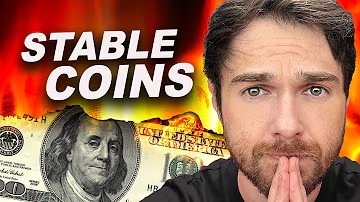Stablecoins are set to revolutionize finance with new legislation like the Genius Act and Clarity Act, enabling banks to integrate crypto, fostering instant global transactions, and potentially positioning Bitcoin as a US reserve asset.
00:00 This video discusses the significant changes in the financial landscape due to the introduction of stablecoins and recent legislative actions that could reshape the relationship between traditional banking and cryptocurrencies.
- Introduction of stablecoins and their potential impact on the banking system.}
- The Genius Act has passed in the Senate, establishing a federal framework for stablecoins, which is expected to enhance regulation and consumer protection.}
- Major companies, including Visa, are preparing to integrate stablecoins into their systems, potentially transforming payment methods worldwide.}
- Upcoming legislation, including the Genius Act and others, will facilitate instant, low-fee payments through stablecoins, bridging traditional banking with the crypto market.}
- Financial institutions like JP Morgan are developing their own stablecoin products, indicating a shift towards mainstream acceptance of cryptocurrencies.}
03:16 The emergence of stablecoins is set to revolutionize the financial landscape by enabling instant, low-cost transactions globally, while regulatory changes are paving the way for banks to engage with cryptocurrencies.
- Stablecoins facilitate instant money transfers globally, eliminating traditional banking delays and high fees.}
- In decentralized finance (DeFi), stablecoins serve as crucial tools for lending, borrowing, and providing stability similar to the dollar.}
- Recent regulatory changes have allowed nationally chartered banks to custody and transact cryptocurrencies, marking a significant shift in the U.S. economy.}
- The Office of the Controller of the Currency (OCC) has approved major banks to hold and manage cryptocurrencies, enhancing their role in the financial system.}
06:31 The video discusses the integration of stablecoins into the economy and highlights a Bitcoin credit card that allows users to earn Bitcoin through everyday purchases. It also introduces a significant legislative development regarding stablecoins in the U.S.
- The discussion begins with the potential for integrating cryptocurrency, specifically stablecoins, into everyday life.}
- The speaker shares personal experiences with a Bitcoin credit card, emphasizing its benefits and the ability to earn Bitcoin on regular purchases.}
- A new legislative framework for stablecoins, known as the Genius Act, is introduced, highlighting bipartisan support and its significance in U.S. Congress.}
09:47 This video discusses the regulatory changes affecting stablecoins and cryptocurrencies, focusing on the proposed Genius Act and Clarity Act, which aim to clarify the legal status of various digital assets.
- The travel rule is introduced to prevent anonymous transactions in cryptocurrency transfers, ensuring transparency similar to traditional wire transfers.}
- The Genius Act could make stablecoins as reliable as checking accounts, indicating a shift towards mainstream acceptance and regulation of digital currencies.}
- The Clarity Act aims to establish clear regulatory categories for cryptocurrencies, resolving the ambiguity that has previously allowed for regulatory uncertainty.}
- The first category under the Clarity Act defines securities, requiring tokens sold as investment contracts to comply with SEC regulations.}
- Payment stablecoins will be overseen by both the SEC and CFTC, indicating a dual regulatory approach for different types of digital assets.}
13:01 The video discusses a proposed Bitcoin Act that aims to make Bitcoin an official US reserve asset, detailing its implications and the mechanisms for implementation.
- Introduction of the Bitcoin Act, which proposes making Bitcoin an official reserve asset for the US government.}
- The act, introduced by Senator Cynthia Lumis, outlines plans for the US Treasury to acquire a significant amount of Bitcoin without needing new taxpayer dollars.}
- Details on how the US Treasury could swap existing cash and liquid assets for Bitcoin, ensuring no additional taxpayer funding is required.}
- The bill includes provisions for a decentralized vault network for Bitcoin storage and guarantees that private citizens can buy and hold Bitcoin without government interference.}
16:15 The video discusses recent developments in the cryptocurrency landscape, particularly focusing on how the Federal Reserve’s policy changes are enabling banks to engage more freely with crypto and stablecoins, which could significantly impact the financial system.
- The video begins by addressing the stability of Bitcoin amidst geopolitical concerns, noting a growing interest from various buyers, including governments.}
- A significant shift occurred when the Federal Reserve retracted a previous letter that restricted banks from engaging with crypto, allowing them to move forward with custody and trading.}
- Jerome Powell’s comments indicate that banks can now conduct crypto activities, but they must navigate the associated reputational risks carefully.}
- The speaker emphasizes that banks must approach crypto custody with caution due to the historical perception of risks associated with cryptocurrencies.}
🔥🔥🔥🔥🔥🔥🔥🔥🔥🔥🔥🔥
🔒Securely store, manage, and protect your coins with Trezor hardware wallets, app & backup solutions. 👉 41% discount
⚠ Some of the links above are for affiliates. I may receive a commission for you signing up for the platform. Always read the terms and conditions before signing up for any product, platform or exchange. If you are from a restricted region you may get profits rolled back. DYOR and approach at your own risk.
⚠️ Crypto Warning: Always do your own research before using any exchange or service mentioned in this video. Exchanges carry risk, and leverage trading can amplify losses. Terms and conditions may change — read them carefully. Some platforms may be non-KYC now but could require KYC in the future. You don’t have a profit until your BTC is in cold storage or your funds are in a bank account. Stay informed and invest responsibly.

